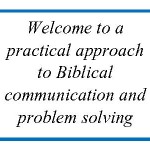I often remark, It is funny how two people see the same thing differently – funny peculiar not funny ha-ha.
The oldest form of problem solving is blame shifting. We read about it in Genesis 3:11b-12: God asked Adam, “Hast thou eaten of the tree, whereof I commanded thee that thou shouldest not eat? And the man (Adam) said, the woman whom thou gavest to be with me, she gave me of the tree, and I did eat.”
One of the most common problem-solving attempts employed is avoidance as seen in Psalms 55:6-8: King David said, “And I said, Oh that I had wings like a dove! for them would I fly away, and be at rest. Lo, then would I wander far off, and remain in the wilderness. Selah*. I would hasten my escape from the windy storm and tempest.”
*Selah: Hebrew: sehlaw: Psalms were Hebrew poetry put to music. Selah is a musical term meaning to pause. Here we have an episode of David talking to David. This term, Selah, comes from the Hebrew word sawlaw meaning to hang up i.e. to weigh, or figuratively, to contemplate.
After David contemplated upon the matter and weighed it out, he gave his readers sound counsel, and he then opted not to handle this problem by avoidance.
Listen to his counsel in Verse 16: “As for me, I will call upon God, and the Lord shall save** me.”
**Save: Hebrew: yawshah: properly to be open, wide or free, (by implication) to be safe. (Author’s comment: This is not a salvation verse.)
In considering David’s counsel, look at the change of his use of personal pronouns in verses 6, 7, 8, and 16 where I is prominent which changes to the 3rd person usage in Verse 22: “Cast thy burdens upon the Lord, and he will sustain thee: he shall never suffer the righteous to be moved***.”
***Moved: Hebrew: mote: to waiver
Literally, David took his own counsel.
All of this is said to simply say this: You cannot solve problems through blame shifting and/or avoidance. These approaches didn’t work in David’s life; they will not work in your life.
Now add this truism: There is always a certain amount of right and a certain amount of wrong on both sides of every issue. Therefor, no one can be 100% right or wrong since, according to Scripture in Romans 3:23, “All have sinned, and come short of the glory of God.”
There are, however, twelve words, if sincerely spoken can resolve any issue: I am wrong. I am sorry. Please forgive me. I love you.
Next time: A Negative Approach to a Positive Response






